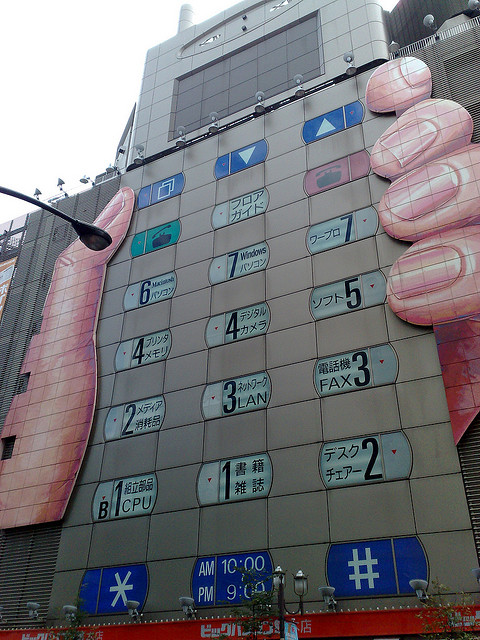Culture shock: Ouroboros of red-tape ate my phone

Unlike other more sensible ex-pats in Japan I opted for an authentic starting up experience.
I came over without a flat, a job, or even a grasp of the Japanese language. Some would call this foolhardy; others might call it brave. I would say that having endured the first month of struggling and spluttering, that I would agree with the former.
Luckily for me I had the help and advice of many other ex-pats who had made similar mistakes and had plenty of useful tips. They all came with one warning, though.
Nothing is ever simple in Japan.
To get basic necessities I had once taken for granted in the UK, meant setting off on the red-tape road. And the secret of the red-tape road is that it never ends. It just curves around on itself like the streets of Pleasantville.
I'm getting ahead of myself. Let's start with my first and arguably most important requirement: communication.
I had been in Japan for barely two days before I was given my first piece of sagely wisdom: "You must have a smartphone", one of my Gaikokujin (foreigner) friends warned. It wasn't a recommendation -- it was a command. For ex-pats in Japan a smartphone is a basic survival tool akin to food, water and a map.
You need a phone and you need it quickly. It's not hard to see why -- if you're trying to make contacts, arranging interviews or looking for accommodation -- it all becomes a lot harder without a phone.
Looking past the basics, though, the smartphone can act as a safety net. With apps to help you find the right subway line, location-based services, always-on mobile Internet access, and most importantly, a translation tool, a smartphone negates the need to actually talk to anyone.
You never have to fear embarrassing yourself through rookie mistakes again.
Thinking back to that first horrific night in Tokyo, I realised that if I had come prepared with a smartphone, things may have been somewhat easier to handle.
I spent the next few days wasting time on travel blunders: ending up on the wrong line, buying the wrong tickets and accidentally ending up on trains that magically change into totally different trains without prior warning. The more mistakes I made the more I started to realise I really did need a smartphone.
Though how useful a phone might have been, acquiring one was not easy and certainly was not quick.
The first option was renting a 3G SIM-card. This service is widely available in Tokyo and you can even rent a phone at the airport upon arrival. You can either rent a full handset, or if you already own a 3G-enabled phone, the option of a SIM is also available.
It might seem very appealing for those who are reluctant to part with their phone, but this is a short-term option at best. The rates on offer were priced low, but renting on a daily basis adds up, and it can become fairly costly.
As I hadn't suddenly developed the ability to generate money with my mind, this was not an option I considered for too long.
Instead I opted for a pre-paid smartphone instead. Almost every major network carries them, and while some are more open to foreigners than others, it was also vastly less expensive than attempting a two-year contract. For the price, you can buy a disproportionately advanced handset; a device more advanced than anything you might buy pre-paid in the UK.
Unfortunately, the costs stack on from that point forward.
I then had to buy top up cards to use the phone, available in ¥3,000 ($40) and ¥5000 ($65), which last for 60 days. Once the bell strikes a minute past the network-imposed deadline, any remaining credit is wiped.
The phone itself was perfect for me, and I was finally reconnected to the world. It did all the basic jobs it needed to without me being committed to a 2-year contract at ¥3,000 a month. It's simple, it's easy and it works. It was just getting it that was frustrating.
The next step was finding someone to then talk to us.
Much like the banks, every branch has a different policy regarding foreigners, and some companies are more willing to help than others. This varies literally shop-to-shop, and the first one we went into was a particularly disheartening experience.
I mustered up the best Japanese I could in order to ask where we could speak to someone about "pre-paid phones". I was immediately met with a too-fast-to-follow response; the only word I caught was 'Gaijin' -- the impolite and somewhat derogatory way of saying 'foreigner'. The half-baked excuse led us to believe they were not "sold out" of pre-paid handsets, but we just moved on.
Not five minutes away in another shop, we were directed straight to the phones and given ample assistance to find what we needed.
In order to start up with any sort of phone contract here, one is required to have an abundance of credentials. The first of which is a landline contact number. The chances of having a landline in Japan as a foreigner is slim-to-none, as they are an expensive commodity one is unlikely to use.
It's even harder to have a landline when you don't have any land to speak of.
You also need a bank account. So, we headed straight for the nearest bank. After being rejected by several, we found one that was happy to give us accounts; only, we needed a mobile phone number to open it.
I'm pretty sure that my screams of frustration could be heard from space.
